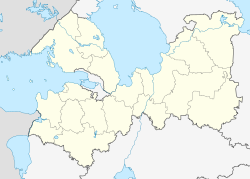
Svalbard is a Norwegian archipelago in the Arctic Ocean. Situated north of mainland Europe, it is about midway between continental Norway and the North Pole. The islands of the group range from 74° to 81° north latitude, and from 10° to 35° east longitude. The largest island is Spitsbergen, followed by Nordaustlandet and Edgeøya. While part of the Kingdom of Norway since 1925, Svalbard is not part of geographical Norway proper; administratively, the archipelago is not part of any Norwegian county, but forms an unincorporated area administered by a governor appointed by the Norwegian government, and a special jurisdiction subject to the Svalbard Treaty that is, unlike Norway proper, outside of the Schengen Area, the Nordic Passport Union and the European Economic Area. Since 2002, Svalbard's main settlement, Longyearbyen, has had an elected local government, somewhat similar to mainland municipalities. Other settlements include the Russian mining community of Barentsburg, the research station of Ny-Ålesund, and the mining outpost of Sveagruva. Ny-Ålesund is the northernmost settlement in the world with a permanent civilian population. Other settlements are farther north, but are populated only by rotating groups of researchers.

A village is a clustered human settlement or community, larger than a hamlet but smaller than a town, with a population ranging from a few hundred to a few thousand. Though villages are often located in rural areas, the term urban village is also applied to certain urban neighborhoods. Villages are normally permanent, with fixed dwellings; however, transient villages can occur. Further, the dwellings of a village are fairly close to one another, not scattered broadly over the landscape, as a dispersed settlement.

Dushanbe is the capital and largest city of Tajikistan. It was named this way because it grew from a village that originally had a popular market on Mondays. As of 2016, Dushanbe had a population of 802,700.

The Jewish Autonomous Oblast is a federal subject of Russia in the Russian Far East, bordering Khabarovsk Krai and Amur Oblast in Russia and Heilongjiang province in China. Its administrative center is the town of Birobidzhan.
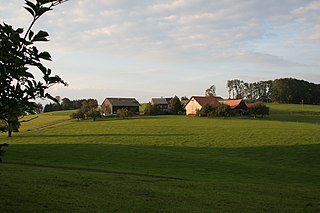
A hamlet is a small or very small human settlement. In different jurisdictions and geographies, a hamlet may be the size of a town, village or parish, or may be considered to be a smaller settlement or subdivision or satellite entity to a larger settlement. The word and concept of a hamlet have roots in the Anglo-Norman settlement of England, where the old French hamlet came to apply to small human settlements. In British geography, a hamlet is considered smaller than a village and distinctly without a church or other place of worship.
Urban-type settlement is an official designation for a semi-urban settlement, used in several Eastern European countries. The term was historically used in Bulgaria, Poland, and the Soviet Union, and remains in use today in 10 of the post-Soviet states.

Fort Ross, originally Fortress Ross, is a former Russian establishment on the west coast of North America in what is now Sonoma County, California. It was the hub of the southernmost Russian settlements in North America from 1812 to 1842. It has been the subject of archaeological investigation and is a California Historical Landmark, a National Historic Landmark, and on the National Register of Historic Places. It is part of California's Fort Ross State Historic Park.

The Saint Petersburg Mosque, when opened in 1913, was the largest mosque in Europe outside Turkey, its minarets 49 meters in height and the dome is 39 meters high. The mosque is situated in downtown St Petersburg. It can accommodate up to five thousand worshippers.
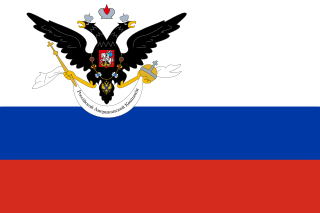
Russian America was the name of the Russian colonial possessions in North America from 1733 to 1867. Its capital was Novo-Arkhangelsk, which is now Sitka, Alaska, United States. Settlements spanned parts of what are now the U.S. states of California, Alaska and three forts in Hawaii. Formal incorporation of the possessions by Russia did not take place until the Ukase of 1799 which established a monopoly for the Russian–American Company and also granted the Russian Orthodox Church certain rights in the new possessions. Many of its possessions were abandoned in the 19th century. In 1867, Russia sold its last remaining possessions to the United States of America for $7.2 million.
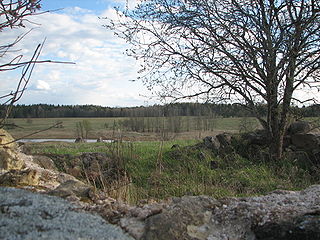
Volosovsky District is an administrative and municipal district (raion), one of the seventeen in Leningrad Oblast, Russia. It is located in the southwest of the oblast with Lomonosovsky District in the north, Gatchinsky District in the east, Luzhsky District in the south, Slantsevsky District in the southwest, and Kingiseppsky District in the northwest. The area of the district is 2,700 square kilometers (1,000 sq mi). Its administrative center is the town of Volosovo. Population: 49,443 (2010 Census); 48,128 ; 46,908 (1989 Census). The population of Volosovo accounts for 24.6% of the district's total population.
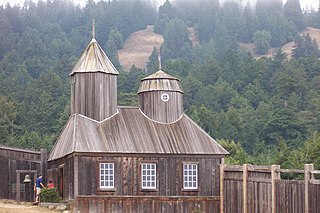
Fort Ross State Historic Park is a historical state park in Sonoma County, California, including the former Russian fur trading outpost of Fort Ross plus the adjacent coastline and native coast redwood forests extending inland. Fort Ross, active from 1812 to 1842, was the southernmost settlement in the Russian colonization of the Americas. The 3,393-acre (1,373 ha) park was established in 1909.
Artem is a common Ukrainian male given name, it is not to be confused with the similar Russian name Artyom which is spelled with the "ё" letter, giving a [-tʲɵm] ending sound. It may refer to:

Vyborg is a town in, and the administrative center of, Vyborgsky District in Leningrad Oblast, Russia. It lies on the Karelian Isthmus near the head of the Vyborg Bay, 130 km to the northwest of St. Petersburg and 38 km south of Russia's border with Finland, where the Saimaa Canal enters the Gulf of Finland. The population of Vyborg has developed as follows: 79,962 (2010 Census); 79,224 (2002 Census); 80,924 (1989 Census)..

KickassTorrents was a website that provided a directory for torrent files and magnet links to facilitate peer-to-peer file sharing using the BitTorrent protocol. It was founded in 2008 and by November 2014, KAT became the most visited BitTorrent directory in the world, overtaking The Pirate Bay, according to the site's Alexa ranking. KAT went offline on 20 July 2016 when the domain was seized by the U.S. government. The site's proxy servers were shut down by its staff at the same time.

Novorossiya, literally New Russia but sometimes called South Russia, is a historical term of the Russian Empire denoting a region north of the Black Sea. It was formed as a new imperial province of Russia in 1764 from military frontier regions along with parts of the southern Hetmanate in preparation for war with the Ottomans. It was further expanded by the annexation of the Zaporizhian Sich in 1775. At various times it encompassed the Moldavian region of Bessarabia, the modern Ukraine's regions of the Black Sea littoral (Prychornomoria), Zaporizhia, Tavria, the Azov Sea littoral (Pryazovia), the Tatar region of Crimea, the Nogai steppe at the Kuban River, and the Circassian lands.
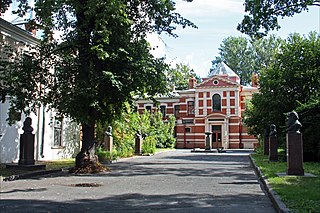
The Institute of Experimental Education is one of the oldest scientific establishments in Russia. It was founded by Alexander of Oldenburg in 1888 along the lines of Louis Pasteur's Pasteur Institute. It was here that Pavlov did much of his groundbreaking physiological research.
IZO-Narkompros was the Department of Fine Arts of the People's Commissariat for Education established after the Bolshevik seizure of power in Russia 1917. It was established in Petrograd on 29 January 1918.

Peter Kuzmich Vaulin (1870-1943) was a Russian ceramics artist active in the first half of the twentieth century
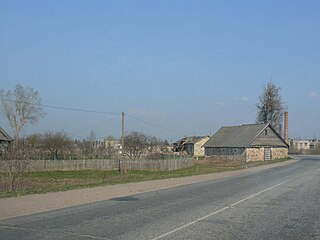
Kikerinsky Rural Settlement is a rural settlement in the Volosovsky District of the Leningrad Oblast. Kikerino is the administrative centre.


